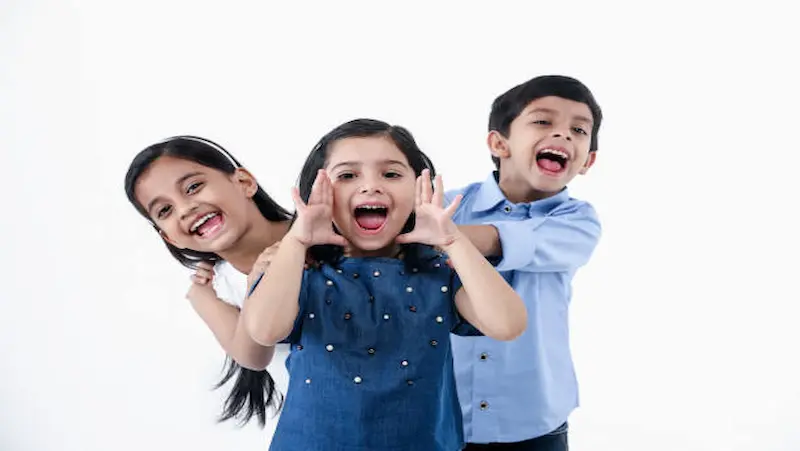Effective speech therapy for kids involves a combination of expert guidance, targeted strategies, and consistent practice
Table of contents
Introduction

Speech therapy is a type of therapy that helps children develop their speech and language skills. It can be used to treat a variety of speech problems, including articulation disorders, fluency disorders, and language disorders. Speech therapy can be very effective in helping children improve their communication skills and reach their full potential.
There are many reasons why speech therapy is important for kids. First, speech and language are essential for communication. Children who have difficulty speaking or understanding language may have difficulty communicating with their peers, teachers, and family members. This can lead to social isolation, academic problems, and low self-esteem.
Second, speech and language are important for learning. Children who have difficulty speaking or understanding language may have difficulty learning in school. They may have difficulty understanding what their teachers are saying, following instructions, and participating in class discussions.
Third, speech and language are important for social-emotional development. Children who have difficulty speaking or understanding language may have difficulty making friends, expressing their emotions, and resolving conflict. This can lead to social problems and emotional distress.
If you are concerned that your child may have a speech or language problem, it is important to talk to your doctor. Your doctor can refer you to a speech therapist who can assess your child’s needs and develop a treatment plan.
Speech therapy is a long-term process, but it can be very effective in helping children improve their communication skills. With the help of a speech therapist, your child can reach their full potential and live a happy and successful life.
What is speech therapy for kids?

Speech therapy is a type of therapy that helps children who have difficulty speaking. Speech therapists, also known as speech-language pathologists (SLPs), work with children to improve their speech, language, and communication skills. Our speech therapy sessions are designed to incorporate a perfect blend of fun & educational activities for kids, ensuring they not only learn but also enjoy their time.
There are many different types of speech disorders that can affect children. Some of the most common types of speech disorders include:
- Articulation disorders: These disorders involve difficulty producing certain sounds. For example, a child with an articulation disorder might say “wabbit” instead of “rabbit.”
- Fluency disorders: These disorders involve difficulty speaking smoothly. For example, a child with a fluency disorder might stutter or have a rapid, halting speech pattern.
- Language disorders: These disorders involve difficulty understanding or using language. For example, a child with a language disorder might have difficulty following directions, understanding what others are saying, or using language in social situations.
Speech therapy can help children with a variety of speech disorders. In our speech therapy sessions, we integrate effective emotional regulation activities for kids, helping them build essential skills to manage their emotions and communicate more effectively. The specific goals of speech therapy will vary depending on the child’s individual needs. However, some common goals of speech therapy include:
- Teaching the child how to produce certain sounds correctly
- Helping the child to speak more fluently
- Improving the child’s understanding and use of language
- Helping the child to communicate more effectively in social situations
Speech therapy can be a very effective way to help children with speech disorders. However, it is important to note that speech therapy is not a quick fix. It can take time and effort for children to make progress. However, with the help of a qualified SLP, most children can make significant improvements in their speech, language, and communication skills.
Here are some expert tips and strategies for parents who are considering speech therapy for their child:
- Don’t wait. The earlier you get your child evaluated for speech therapy, the sooner they can start receiving the help they need.
- Find a qualified SLP. Not all SLPs are created equal. Do your research to find an SLP who is experienced in working with children with the type of speech disorder your child has.
- Be patient. Speech therapy takes time and effort. Don’t get discouraged if your child doesn’t see results immediately.
- Get involved. Speech therapy is most effective when parents are involved. Be sure to attend your child’s therapy sessions and follow the SLP’s instructions at home.
- Be positive. A positive attitude can go a long way in helping your child succeed in speech therapy. Let your child know that you believe in them and that you are there to support them every step of the way.
With the help of a qualified SLP and the support of their parents, most children can make significant improvements in their speech, language, and communication skills.
Signs your child may need speech therapy

Here are some signs that your child may need speech therapy:
- Not babbling by 12 months. Babbling is a natural way for babies to practice making sounds and learning the building blocks of speech. If your baby isn’t babbling by 12 months, it’s a sign that they may be behind in their speech development.
- Not saying any words by 18 months. Most babies start saying their first words around 12 months. If your baby hasn’t said any words by 18 months, it’s a sign that they may be behind in their speech development.
- Not using two-word phrases by 24 months. By 24 months, most toddlers are using two-word phrases like “mama milk” or “ball go.” If your toddler isn’t using two-word phrases by 24 months, it’s a sign that they may be behind in their speech development.
- Not understanding simple instructions by 30 months. By 30 months, most toddlers should be able to understand simple instructions like “give me the ball” or “come here.” If your toddler isn’t understanding simple instructions by 30 months, it’s a sign that they may be behind in their speech development.
- Having trouble pronouncing certain sounds. It’s normal for young children to have trouble pronouncing certain sounds. However, if your child is still having trouble pronouncing certain sounds by 3 years old, it’s a sign that they may need help from a speech therapist.
- Not talking much or at all. Some children are naturally shy or quiet. However, if your child is not talking at all or very little, it’s a sign that they may have a speech delay.
- Having difficulty understanding others. If your child has difficulty understanding what others are saying, it’s a sign that they may have a speech delay.
If you’re concerned that your child may have a speech delay, it’s important to talk to your doctor. Your doctor can refer you to a speech therapist who can assess your child’s speech and language skills and develop a treatment plan. Explore a world of possibilities with growth mindset books for kids incorporated in our speech therapy program, encouraging children to believe in their potential and persevere in their communication goals
Speech therapy can be very helpful for children with speech delays. With the help of a speech therapist, your child can learn to communicate more effectively and improve their social skills.
How to find a qualified speech therapist

Here are some tips for finding a qualified speech therapist for your child:
- Ask your child’s doctor or teacher for a referral. They may be able to recommend a therapist in your area who is qualified and experienced in working with children with speech and language disorders.
- Check local directories online. There are many websites that list speech therapists in your area. You can search by location, specialty, and insurance accepted.
- Search on the American Speech-Language-Hearing Association (ASHA) website. ASHA is a professional organization for speech-language pathologists and audiologists. Their website has a searchable database of certified speech-language pathologists.
- Interview potential therapists. Once you have a few names of potential therapists, schedule interviews with each one. This will give you a chance to ask questions and get to know them better.
When interviewing potential therapists, be sure to ask about the following:
- Their experience working with children with speech and language disorders.
- Their approach to therapy.
- Their availability.
- Their fees.
It is also important to feel comfortable with the therapist. This is someone who will be working with your child on a regular basis, so it is important to find someone you trust and who you feel is a good fit for your child. Also, We integrate mindfulness books for kids into our speech therapy sessions, helping young learners enhance their focus, self-awareness, and communication skills.
Speech therapy can be a very effective way to help children with speech and language disorders. By finding a qualified and experienced therapist, you can give your child the best possible chance of success.
Here are some additional tips for finding a qualified speech therapist:
- Make sure the therapist is licensed and certified. In most states, speech therapists must be licensed by the state. They may also be certified by a professional organization, such as ASHA.
- Ask about the therapist’s training and experience. The therapist should have experience working with children with a variety of speech and language disorders.
- Find out what kind of therapy the therapist provides. There are many different approaches to speech therapy. Some therapists use traditional methods, while others use more innovative approaches.
- Ask about the therapist’s fees. Speech therapy can be expensive, so it is important to find out what the therapist’s fees are before you start therapy.
Finding a qualified speech therapist can be a challenge, but it is important to take the time to find someone who is right for your child. With the right therapist, your child can make significant progress in their speech and language development.
Speech therapy techniques for kids

Speech therapy can be a great way for kids to improve their communication skills. There are many different techniques and exercises that can be used in speech therapy, and some of these can be done at home. Here are a few examples:
- Repetition: One of the most basic speech therapy techniques is repetition. This involves having the child repeat sounds, words, or phrases over and over again. This helps to train the child’s muscles to make the correct sounds and to improve their pronunciation.
- Modeling: Modeling is another common speech therapy technique. This involves the therapist demonstrating the correct way to make a sound or say a word. The child can then imitate the therapist’s movements and sounds.
- Visual aids: Visual aids can also be helpful in speech therapy. These can include pictures, objects, or even puppets. Visual aids can help the child to understand what they are trying to say and to make the correct sounds.
- Games and activities: Games and activities can make speech therapy more fun and engaging for children. There are many different games and activities that can be used to improve speech and language skills.
It is important to note that speech therapy is a personalized process. The specific techniques and exercises that are used will vary depending on the child’s individual needs. If you are concerned about your child’s speech or language development, it is important to talk to their doctor or a speech-language pathologist. They can assess your child’s needs and recommend the best course of treatment. Through engaging anger management activities for kids, our speech therapy sessions provide a safe space for children to learn how to manage and express their anger appropriately.
Here are some additional tips for helping your child with speech therapy at home:
- Be patient and encouraging: Speech therapy can take time and effort. It is important to be patient and encouraging with your child. Praise them for their efforts, even if they do not always get it right.
- Make it fun: Speech therapy should be fun for your child. If they are not enjoying themselves, they are less likely to want to participate. Try to make speech therapy activities as fun and engaging as possible.
- Be consistent: The more your child practices, the better they will get. Make sure to practice speech therapy techniques and exercises on a regular basis.
- Get involved: Speech therapy is not just for the child. Parents and caregivers can also play a role in helping their child with speech therapy. Get involved in the process and work with the therapist to create a plan that is right for your child.
With patience, encouragement, and consistency, you can help your child improve their speech and language skills.
Supporting your child’s speech therapy at home

Here are some tips and strategies for supporting your child’s speech therapy progress at home:
- Be positive and encouraging. Children learn best when they feel supported and encouraged. Make sure to praise your child for their efforts, even if they don’t always get it right.
- Make it fun. Speech therapy should be fun for your child. Try to incorporate activities that your child enjoys into their therapy sessions. For example, if your child loves to play with cars, you could use cars to practice making different sounds.
- Be patient. It takes time for children to learn new skills. Don’t get discouraged if your child doesn’t see results immediately. Just keep practicing and be patient.
- Get involved. Speech therapy is most effective when parents are involved. Ask your child’s speech therapist for ideas on how you can help at home.
- Be consistent. The more consistent you are with speech therapy, the better your child will learn. Try to do speech therapy activities every day, even if it’s just for a few minutes.
Here are some specific activities that you can do with your child at home to support their speech therapy progress:
- Sing songs. Singing is a great way to practice making different sounds. You can sing songs that your child knows, or you can find new songs that are designed to help with speech development.
- Read books. Reading books is a great way to help your child learn new vocabulary and grammar. You can also point out different sounds in the words as you read.
- Play games. There are many games that you can play with your child to help them practice their speech skills. Some examples include:
- Puzzles: Puzzles can help your child learn about sequencing and problem-solving.
- Matching games: Matching games can help your child learn about vocabulary and categories.
- Sorting games: Sorting games can help your child learn about colors, shapes, and sizes.
- Talk to your child. The most important thing you can do to support your child’s speech therapy progress is to talk to them. Talk to them about everything, from what you’re doing to what you’re thinking. The more you talk to your child, the more they’ll learn to communicate.
If you have any concerns about your child’s speech development, be sure to talk to their doctor. They can refer you to a speech therapist who can help your child reach their full communication potential. In our speech therapy sessions, we introduce the concept of growth mindset vs fixed mindset for kids, helping them understand how their beliefs about learning impact their communication journey.
Conclusion
In conclusion, effective speech therapy for children is a crucial aspect of their overall development and well-being. By employing expert tips and strategies, therapists can create a supportive and engaging environment that encourages language acquisition and communication skills.
The use of individualized treatment plans, incorporating play-based activities, technology-assisted interventions, and involving parents as active participants, can enhance the effectiveness of speech therapy. It is important to remember that every child is unique, and therapy approaches should be tailored to their specific needs.
With the right techniques, dedication, and collaboration between therapists, parents, and educators, children can overcome speech difficulties and unlock their full potential, paving the way for a brighter future.
To get your hands on more such educational and free resources on coding, robotics, game development, etc., do check out the Brightchamps Blog Page now! Check out money lessons for kids.
BrightChamps also provides code games for kids, offering a fun and interactive way to learn coding. With our engaging platform, children can explore the world of programming, develop critical thinking skills, and unlock their creativity.
Elevate your child’s learning journey with BrightChamps, the leading EdTech platform offering a transformative trio of robotics, financial education, and coding courses.
Frequently Asked Questions
Speech therapy for kids is a specialized intervention that helps children improve their communication skills, including speech, language, and social communication abilities.
Consider speech therapy for your child if they struggle with articulation, stuttering, language delays, social communication difficulties, or if their speech affects their academic or social interactions.
Common speech disorders in children include articulation disorders (difficulty pronouncing sounds), language disorders (trouble understanding or using language), fluency disorders (stuttering), and voice disorders (vocal quality issues).
To find a qualified speech therapist for your child, consult your pediatrician, school or educational institutions, local speech-language pathology associations, or search online directories specialized in speech therapy professionals.
Support your child’s speech therapy at home by practicing their exercises and techniques regularly, creating a language-rich environment, reading together, using visual aids, providing positive reinforcement, and maintaining open communication with the speech therapist.


 We are an army of educators and passionate learners from BrightChamps family, committed to providing free learning resources to kids, parents & students.
We are an army of educators and passionate learners from BrightChamps family, committed to providing free learning resources to kids, parents & students.







